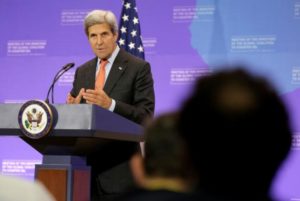by WorldTribune Staff, July 24, 2016
U.S. President Barack Obama and Secretary of State John Kerry are once again naively banking on Russian President Vladimir Putin’s good faith in the U.S.’s latest proposal for cooperation against jihadist groups in Syria, critics said.
U.S. military and intelligence officials said Obama and Kerry are being set up by Putin, who has laid a trap “to discredit the United States with moderate rebel groups and drive some of their fighters into the arms of Islamic State and other extremist groups.”

The new proposal includes intelligence sharing and the coordination of airstrikes between Washington and Moscow against the Al Qaida-affiliated Nusra Front and. It would also prohibit the Syrian air force from attacking moderate rebel groups.
“One: The Russians’ aim in Syria is still either keeping (President Bashar) Assad in power or finding some successor who is acceptable to them. … And two: Putin has proved over and over again, and not just in Syria, that he cannot be trusted to honor any agreement he makes if he decides it’s no longer in Russia’s interest,” said a U.S. official, speaking on condition of anonymity.
Critics say the Obama administration’s plan is deeply flawed as it would allow the Russians and Syrians to use ground troops and artillery against moderate rebels groups fighting Assad’s forces.
In a meeting with Putin last week, Kerry failed to mention Russian violations of a cessation of hostilities agreement even though the CIA publicly confirmed the violations.
“What’s striking is not what Kerry has said, but what he’s failed to say,” a U.S. official told Reuters, adding that Kerry had left out the “inconvenient facts” about Russian violations.
Some European members of the U.S.-led coalition against Islamic State of Iraq and Levant (ISIL) have expressed concern about sharing intelligence with Russia, which they say has been an untrustworthy partner in Syria.
“The two sides would then, through joint analysis, decide who to target … by getting the U.S. in the same tactical room; Moscow would then have to guarantee that Assad’s planes stopped bombing,” a European diplomat told Reuters. Kerry “is, in his Kerry way, optimistic. But the devil is in the details, and we’re not convinced that Moscow is serious.”
Robert Ford, a former U.S. ambassador to Syria and now a senior fellow at the Middle East Institute think tank in Washington, told Reuters that whether it was Moscow’s bad intent or lack of leverage, “it’s not clear to me that the Russians can deliver on their side of the deal.”
Andrei Klimov, deputy chairman of the international affairs committee in Russia’s upper house of parliament, said that even if the plan is agreed upon, it would be for only a short time, until the next U.S. administration takes office. Obama’s presidency ends in January.
“I’m afraid Assad will expect tricks from the Americans,” Klimov told Reuters. “They have been saying constantly he’s an outcast … and now they’re about to tell Assad, ‘You know, please give us a day’s advance notice before you want to trash someone with your forces.’ ”
“Every time while talking to Assad we have to convince him, give arguments, additional guarantees. … We can’t give him orders, he’s on his own soil.”
